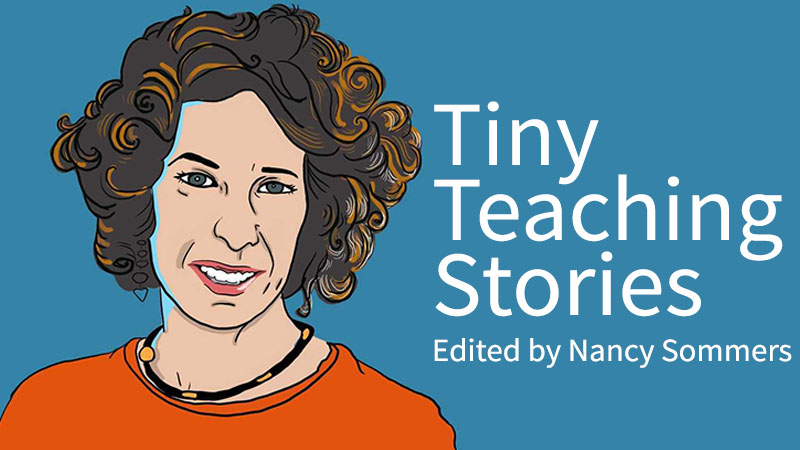-
About
Our Story
back- Our Mission
- Our Leadershio
- Accessibility
- Careers
- Diversity, Equity, Inclusion
- Learning Science
- Sustainability
Our Solutions
back
-
Community
Community
back- Newsroom
- Webinars on Demand
- Digital Community
- The Institute at Macmillan Learning
- English Community
- Psychology Community
- History Community
- Communication Community
- College Success Community
- Economics Community
- Institutional Solutions Community
- Nutrition Community
- Lab Solutions Community
- STEM Community
- Newsroom
- Macmillan Community
- :
- English Community
- :
- Bits Blog
Bits Blog
Options
- Mark all as New
- Mark all as Read
- Float this item to the top
- Subscribe
- Bookmark
- Subscribe to RSS Feed
Bits Blog
Showing articles with label Corequisite Composition.
Show all articles
Author
03-31-2025
10:40 AM
Kim Haimes-Korn is a Professor of English and Digital Writing at Kennesaw State University. She also trains graduate student teachers in composition theory and pedagogy. Kim’s teaching philosophy encourages dynamic learning and critical digital literacies and focuses on students’ powers to create their own knowledge through language and various “acts of composition.” She is a regular contributor to this Multimodal Monday academic blog since 2014. She likes to have fun every day, return to nature when things get too crazy, and think deeply about way too many things. She loves teaching. It has helped her understand the value of amazing relationships and boundless creativity. You can reach Kim at khaimesk@kennesaw.edu or visit her website: Acts of Composition Why is digital literacy important for teachers and students? In today’s rapidly evolving digital landscape, digital literacy is a range of essential skills that help us navigate the digital world where we spend a significant amount of time. Our students are continually immersed in online situations, making digital literacies an integral part of our teaching and learning. They must learn how to communicate, critically analyze online content, and creatively use digital platforms in meaningful ways. In their article, Digital Writing Across the Curriculum (2010), Hague and Payton define eight components of digital literacy: creativity, critical thinking and evaluation, cultural and social understanding, collaboration, finding and selecting information, effective communication, e-safety, and functional skills.” Even though students are engaged in these digital practices, we can expand our teaching to include practices in these skills along with the analysis of the cultural and ethical implications of digital literacy. Components of Digital Literacy (Hague & Payton, 2010, p19)I try to incorporate all of these practices into my curriculum design and have recently focused on functional skills. I always say, “I don’t teach tools; I teach digital intuition.” The reason I say this is 1) Tools change, 2) I like to give options for platforms and tool choices rather than prescribing a particular one, and 3) Digital intuition is a critical literacy skill that students only develop through “mucking through” and figuring it out on their own. It also teaches them research and reading skills as they independently seek out solutions and solve their own problems through articles, forums, and documentation. While I feel strongly about this approach, there are exceptions to this stance when we find tools that are so versatile and offer many possibilities that they open up possibilities rather than limit them. Recently, I have directly integrated some tools into my assignments and deliverables and found that they have the potential to create collaborative discussion spaces for problem-solving and extending students’ digital intuition. Canva, a conceptual and visual design platform, is perfect for multimodal composing and enhancing a range of digital literacy skills. With its low learning curve and user-friendly interface, Canva requires minimal additional classroom instruction and is a vital resource for content creation. Canva’s mission is to “empower everyone in the world to design anything and publish anywhere.” Using visualization tools is also a marketable skill that students can take into professional contexts. This platform easily integrates with composition pedagogy throughout the writing process, from invention to drafting to delivery. And it’s free. Applications of Canva in the Classroom Brainstorming and Invention While Canva is often thought of as a tool for creating polished content, it also offers embedded components that help students with brainstorming, drafting, and collaboration. I introduce it to create storyboards, concept and mind maps, and planning documents (proposals). The whiteboard tool encourages real-time collaboration and visual brainstorming techniques. We can encourage Design Thinking as a problem-solving framework. “Unlike other brainstorming methods, design thinking uses empathetic observation to focus on human-centered needs first before diving into ideation.” Data Visualization Research is an important skill that we teach our students. Data visualization brings research to life as students take their research data and create infographics, charts, and graphs, giving them visual ways to represent their work. Canva provides an abundance of templates for students to create impactful visual arguments that transcend traditional text-only documents. Microcontent Our students interact with microcontent regularly as they surf the internet and participate in social media. Canva offers many possibilities for students to create microcontent for academic, personal, and professional purposes. Through community engagement and service-learning projects, I have students create content such as memes, reels/videos, posters, flyers, promotions, and newsletters for professional organizations. I teach students about the ethical use of images, but Canva offers thousands of copyright-free images that students can use in their work. Additionally, digital storytelling and comic strips provide creative avenues for expression. Presentations Canva provides a variety of templates for creating engaging presentations, such as pitch decks, proposals, and presentations. Students can present research, collaborative projects, marketing plans, and media kits, among others. Check out (and share with students) their beginners guide to Creating Engaging Presentations. Students can also present their work and learning through digital portfolio templates to showcase their work. Educator Resources Canva has also done a good job of providing resources for teachers and students. They have resources specifically for educators to create lesson plans, presentations, and pedagogical tools (see 10 Ways to Take Your Lessons to the Next Level with Canva). Teachers can create interactive polls and surveys to evaluate student engagement and learning. You will find an expansive educator community that shares pedagogical perspectives, classroom practices, and samples such as book covers, literary quote books, and narrative maps. **************************** Although this post focuses on Canva, many other tools are available for students to explore. However, Canva’s versatility makes it particularly effective for practicing a wide range of digital literacy skills within a single platform. For more ideas, The NCTE Definition of Literacy in A Digital World offers a specific breakdown of digital literacy skills and ways to apply them in the classroom. To this list, we also need to add strategies and ethical components of AI. As students move into professional contexts, they will adapt and expand these skills with more advanced options and new rhetorical contexts. As the definition of digital literacy continues to expand, teachers play a crucial role in helping students navigate new technologies, create meaningful content, and engage thoughtfully in the digital world.
... View more
Labels
-
Composition
-
Corequisite Composition
-
Professional Resources
0
2
1,843
Author
04-07-2023
07:00 AM
Today's Tiny Teaching Story is by Jordan Hill, composition instructor in the Global First Year program at Florida International University. A recently-selected Fulbright Scholar, he will soon move to Italy to research a short story collection.
Idioms
I tell my class of international students that a certain American literary character is “an odd duck.” They stare at me with tilted heads and confused smiles. I imagine what they must be imagining—Jay Gatsby as a strange waterfowl. I clear my throat. “Sorry, everyone,” I say. “An ‘odd duck’ is an idiom. An expression.” How can I explain this? “An odd duck is sort of like a black sheep.” Again, the quizzical faces. Too late, I register my second, unintentional idiom. I sigh and explain what happened. They laugh, and I try again.
Submit your own Tiny Teaching Story to tinyteachingstories@macmillan.com! See the Tiny Teaching Stories Launch for submission details and guidelines.
... View more
Labels
-
Composition
-
Corequisite Composition
-
Developmental English
-
Literature
1
1
1,833
Author
03-17-2023
07:00 AM
Today's Tiny Teaching Story is by Xinqiang Li, a writing instructor at Michigan State University.
Class as People
It’s the students who have inspired me to bring out the best in my teaching. Their eager questions, timely submissions, and even the smiley faces at the end of their emails remove my nervousness and tiredness at the beginning of the semester.
They remind me to teach the class as people.
Gradually, I’ve learned to imagine the class as a tea house conversation. I step off the platform, walk among the students, and change the sentence “Writing is an epistemic and recursive process” into “How many drafts do you usually write?”
Then, I see eyes light up in the class.
Submit your own Tiny Teaching Story to tinyteachingstories@macmillan.com! See the Tiny Teaching Stories Launch for submission details and guidelines.
... View more
Labels
-
Composition
-
Corequisite Composition
-
Developmental English
-
Literature
2
1
1,517
Author
02-24-2023
07:00 AM
Today's Tiny Teaching Story is by Christine Cucciarre, Professor of English and Director of Composition at the University of Delaware.
Weight
I read the want ads during the pandemic. At the end of each Zoom class, I clicked “Leave Meeting,” and cried. Maybe I could drive a truck. Sling mulch at Home Depot. Stock shelves at Target. Just to go to work. Leave work. Be home. No torment of failing my students, failing myself.
Fall semester I returned to the classroom. Walk to work. Teach. Return home. Repeat. Still, no lingering with students, office conferences, chatting with colleagues in the copy room.
The sudden weight of the pandemic was so easy to put on, but it’s so hard to take off.
Submit your own Tiny Teaching Story to tinyteachingstories@macmillan.com! See the Tiny Teaching Stories Launch for submission details and guidelines.
... View more
Labels
-
Composition
-
Corequisite Composition
-
Developmental English
-
Literature
1
2
1,999
Author
02-03-2023
07:00 AM
Today's Tiny Teaching Story is by Stuart Barbier, a Professor of English at Delta College. Partly Veiled Validation I returned to mask-to-mask teaching after three semesters asynchronously online. About half of our college's students elected to return, too. Yet, the hallways were oddly quiet, and I only saw a few colleagues. I'd always speak, even if just a quick hello. One colleague barely acknowledged my greeting the first time, and then was silent all the others, not even looking my way when I added his name. Might as well have been online with my camera off. In contrast, my students acknowledged my presence with their eyes, words, and only partly veiled validation. Submit your own Tiny Teaching Story to tinyteachingstories@macmillan.com! See the Tiny Teaching Stories Launch for submission details and guidelines.
... View more
Labels
-
Composition
-
Corequisite Composition
-
Developmental English
-
Literature
0
0
1,116
Author
01-20-2023
07:00 AM
Today's Tiny Teaching Story is by John Hansen. John Hansen received a BA in English from the University of Iowa and an MA in English literature from Oklahoma State University. His work has appeared or is forthcoming in The Summerset Review, One Sentence Poems, The Dillydoun Review, Schuylkill Valley Journal, Eunoia Review, Litro Magazine, Wild Roof Journal, The Banyan Review, Drunk Monkeys, and elsewhere. He has presented on a variety of topics at The National Institute for Staff and Organizational Development (NISOD), The Conference on College Composition and Communication (CCCC—Regional), The American Comparative Literature Association, The Midwest Conference on British Studies, and others. He is an English Department faculty member at Mohave Community College in Arizona. Read more at johnphansen.com. Unknown Impacts: Be Kind Early in the Fall 2020 semester, I sent e-mails to several students who stopped participating in our developmental English course. Ben responded two days later apologizing. Hours later, I answered the phone - it was Ben. Small talk quickly turned to him revealing a recent divorce, eviction, and layoff (due to COVID-19). I chatted with Ben weekly. He became one of the better writers in class. Days before the semester ended, Ben sent an e-mail about how he would have ended his life if he didn't have someone to talk with that day. I've reflected on this and Ben every semester. Submit your own Tiny Teaching Story to tinyteachingstories@macmillan.com! See the Tiny Teaching Stories Launch for submission details and guidelines.
... View more
Labels
-
Composition
-
Corequisite Composition
-
Developmental English
-
Literature
1
1
3,680
Author
01-13-2023
07:00 AM
Today's Tiny Teaching Story is by Eileen Curran-Kondrad, Teaching Lecturer, English, at Plymouth State University. Eileen has written her story as a poem. About the Course No birdies, no eagles no long drives I slink off the course after the ninth On the terrace outside the clubhouse college tournament players mill around. I browse the tables brimming with golf swag. A voice calls out a young man approaches. Remember me? I took your class last year. We read five books that semester. You turned me into a reader. I went on to read David Copperfield. I just had to tell you. I roll my clubs to the car chuckle to myself. Did I just get a hole in one? Submit your own Tiny Teaching Story to tinyteachingstories@macmillan.com! See the Tiny Teaching Stories Launch for submission details and guidelines.
... View more
Labels
-
Composition
-
Corequisite Composition
-
Developmental English
-
Literature
0
0
1,049
Author
01-13-2023
07:00 AM
Today's Tiny Teaching Story is by Kyle McIntosh, an Assistant Professor in the Department of English and Writing at the University of Tampa where he teaches in the Academic Writing and TESOL Certificate programs. Mirror “The professor always provides such useful feedback. I don’t know how he has time to read each paper so carefully,” wrote a student on my course evaluation last fall. “He never gives us any feedback,” wrote another. “He doesn’t care about students at all.” Suddenly, I wondered: “Are there two versions of me – one good teacher and one bad – who appear to different students in the same class at different moments on different days? And which one is the me who is reading these comments now?” Just to be safe, I shave off my goatee. Submit your own Tiny Teaching Story to tinyteachingstories@macmillan.com! See the Tiny Teaching Stories Launch for submission details and guidelines.
... View more
Labels
-
Composition
-
Corequisite Composition
-
Developmental English
-
Literature
0
0
1,104
Author
12-16-2022
07:00 AM
Today's Tiny Teaching Story is by Dr. Chris M. Anson. Chris is a Distinguished University Professor at North Carolina State University, where he is also the Director of the Campus Writing & Speaking Program.
The Big Reveal
On the last day of the semester, the elderly bearded gentleman in my 200-student course on English language and linguistics approached me, smiling. “I have thoroughly enjoyed this class,” he said. “You’re clearly a dedicated and student-centered teacher.” As a newly-minted professor, I took his words as high praise. “You see, I’m retired,” he continued, “but I take one course each semester to keep learning.” “That’s awesome!” I said. “What sort of work did you do?” He smiled. “Until last year, I was the provost here.” Stunned, I realized that his gift was more than his praise; it was waiting until the end to disclose.
Submit your own Tiny Teaching Story to tinyteachingstories@macmillan.com! See the Tiny Teaching Stories Launch for submission details and guidelines.
... View more
Labels
-
Composition
-
Corequisite Composition
-
Developmental English
-
Literature
0
0
1,028
Author
12-02-2022
07:00 AM
Today's Tiny Teaching Story is by Kelle Alden, an Assistant Professor of English and Director of the Writing Center at the University of Tennessee at Martin. Every Year, I Flunk a Decent Person During our conference, I showed my student the math. Regardless of his excellent attendance and participation, without his missing homework and essays, he would fail English. My student looked sheepish, gave excuses, promised to catch up. I no longer take it personally when students lie to me. I try to teach in the moment, to appreciate how my student smiles and greets me every day. Seeing the whole of him will help after finals, when I have to deliver my most difficult lesson. I will still smile for him next semester, even if he cannot return the gesture right away. Submit your own Tiny Teaching Story to tinyteachingstories@macmillan.com! See the Tiny Teaching Stories Launch for submission details and guidelines.
... View more
Labels
-
Composition
-
Corequisite Composition
-
Developmental English
-
Literature
0
0
1,082
Author
11-11-2022
07:00 AM
Today's Tiny Teaching Story is by Dr. Leslie Werden, a Professor of English & Rhetoric and Department Head of Humanities at Morningside University in Sioux City, Iowa. She teaches Persuasive Writing, Small Group Communication, Literary Theory & Analysis, British Literature, Page to Stage, and more. Blaming Binaries The large post-it note, halved with a line down the middle separating a list of binaries, was left behind in the classroom. On one side: white, power, strength, leader, good. On the other: black, no control, weakness, follower, bad. The lone black student arrived in the classroom and cocked her head, glaring at the list, brows furrowed, lips tightly pressed together. “What. Is. This?” she asked her professor. A discussion about three different stories from the class before. “Thank God,” the student said. The binaries left behind, assume too much and remain misunderstood. Submit your own Tiny Teaching Story to tinyteachingstories@macmillan.com! See the Tiny Teaching Stories Launch for submission details and guidelines.
... View more
Labels
-
Composition
-
Corequisite Composition
-
Developmental English
-
Literature
0
0
1,221
Author
10-21-2022
07:00 AM
Today's Tiny Teaching Story is by Lauri Mattenson. Lauri is a Lecturer with UCLA Writing programs. Holding Zoom Space She’s sitting in her empty bathtub, laptop propped up on a stack of towels, because there’s no room anywhere else in the apartment. He’s in his garage using his neighbor’s wifi. She’s on academic probation and never submitted a draft. They are using a laptop with seven missing keys and a cracked screen. He hasn’t had a good night’s sleep in two weeks. She’s taking care of three little sisters during class. He’s the only Covid-negative person in a household of six. They are working 25 hours a week while going to school full-time. We’re weary, but we’re all here. Submit your own Tiny Teaching Story to tinyteachingstories@macmillan.com! See the Tiny Teaching Stories Launch for submission details and guidelines.
... View more
Labels
-
Composition
-
Corequisite Composition
-
Developmental English
-
Literature
0
0
1,064
Author
09-30-2022
07:00 AM
Today's Tiny Teaching Story is by Jennifer Smith Daniel, Director of Writing Center and Writing Across the Curriculum Programs at Queens University of Charlotte. Restoring Your Tongue... Earlier in the Center, you’d encouraged a first-year with her assignment. Then sat in the comfy red chair of my office as essential oils penetrated our masks to cry out your anger at the professor who commented on your writing with his elitist, prescriptive perspective. He never learned the story of how your family stopped speaking Spanish at home because you didn’t get registered for preschool after migrating from Mexico. Later, I stood in the front our class as another white women teacher and offered you Anzaldúa. You found restoration in the new word - Chicana. Submit your own Tiny Teaching Story to tinyteachingstories@macmillan.com! See the Tiny Teaching Stories Launch for submission details and guidelines.
... View more
Labels
-
Composition
-
Corequisite Composition
-
Developmental English
-
Literature
1
0
1,105
Author
09-09-2022
07:00 AM
Today's Tiny Teaching Story is by Pamela Childers, a lifelong secondary, undergraduate and graduate school educator, writer, editor, and consultant. She enjoys collaborating with colleagues and students. My First Teacher Letitia, my Welsh Grammie, took me at three to the circus in Philadelphia, while Mother worked at a switchboard and Dad was still overseas after the war. She read me poetry and prose long after I had started teaching English and recited Shakespeare for the Princeton Women’s Club in her late seventies, an age I am close to reaching. When I last visited her in the dementia ward of the nursing home, she looked up at me from her wrinkled pillow, smiled and said, “I raised you, didn’t I?” I nodded, and we both shared an unforgotten memory. Submit your own Tiny Teaching Story to tinyteachingstories@macmillan.com! See the Tiny Teaching Stories Launch for submission details and guidelines.
... View more
Labels
-
Composition
-
Corequisite Composition
-
Developmental English
-
Literature
1
1
1,397
Author
08-19-2022
07:00 AM
Today's Tiny Teaching Story is by Rhona Blaker. Blaker is an adjunct instructor of English at Glendale Community College, where she also serves as the Campus Coordinator for Contexualized Teaching and Learning. From the Pantry Most mornings I stare at my own face next to twenty-five black squares. One Thursday, desperate for human contact, I begged the students to reveal their faces. Three students complied. Later, a young woman e-mailed to say she never turns her camera on because she takes class on a tablet while sitting in a pantry, trying to escape the ten other people who live in her apartment. I apologized for imagining English 101 was ever about me and rejoiced when she later wrote to say she had been accepted to UCLA after earning a 4.0 GPA in her community college closet. Submit your own Tiny Teaching Story to tinyteachingstories@macmillan.com! See the Tiny Teaching Stories Launch for submission details and guidelines.
... View more
Labels
-
Composition
-
Corequisite Composition
-
Developmental English
-
Literature
1
3
1,732
Topics
-
Bedford New Scholars
42 -
Composition
238 -
Corequisite Composition
33 -
Developmental English
31 -
Events and Conferences
18 -
Instructor Resources
6 -
Literature
40 -
Professional Resources
7 -
Virtual Learning Resources
4
Popular Posts








